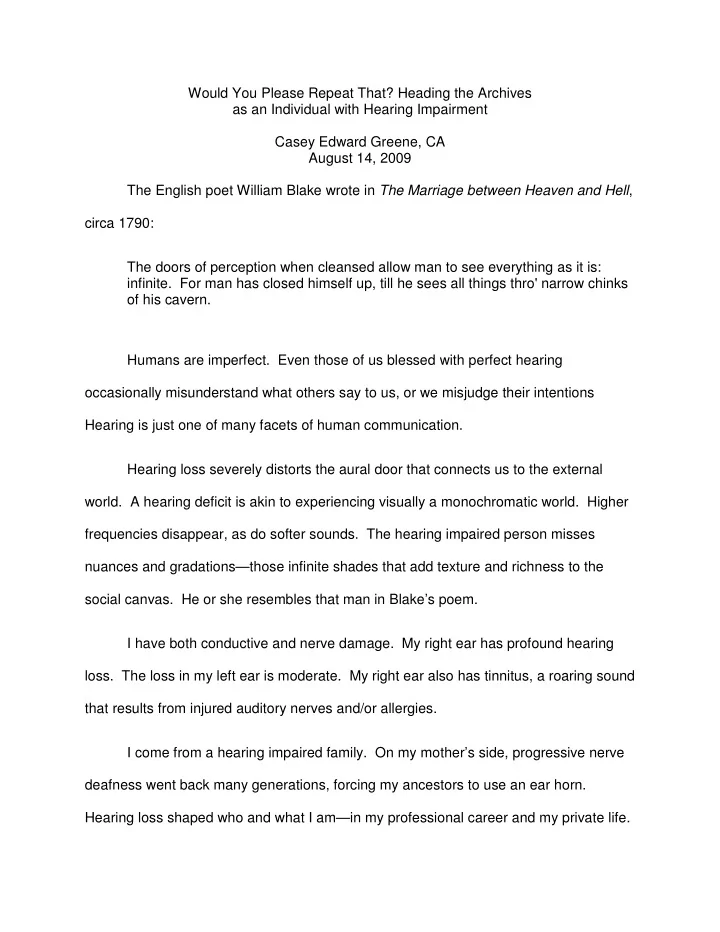

Would You Please Repeat That? Heading the Archives as an Individual with Hearing Impairment Casey Edward Greene, CA August 14, 2009 The English poet William Blake wrote in The Marriage between Heaven and Hell , circa 1790: The doors of perception when cleansed allow man to see everything as it is: infinite. For man has closed himself up, till he sees all things thro' narrow chinks of his cavern. Humans are imperfect. Even those of us blessed with perfect hearing occasionally misunderstand what others say to us, or we misjudge their intentions Hearing is just one of many facets of human communication. Hearing loss severely distorts the aural door that connects us to the external world. A hearing deficit is akin to experiencing visually a monochromatic world. Higher frequencies disappear, as do softer sounds. The hearing impaired person misses nuances and gradations—those infinite shades that add texture and richness to the social canvas. He or she resembles that man in Blake’s poem. I have both conductive and nerve damage. My right ear has profound hearing loss. The loss in my left ear is moderate. My right ear also has tinnitus, a roaring sound that results from injured auditory nerves and/or allergies. I come from a hearing impaired family. On my mother’s side, progressive nerve deafness went back many generations, forcing my ancestors to use an ear horn. Hearing loss shaped who and what I am—in my professional career and my private life.
I’m one of many people with hearing loss. As the American population ages, the degree of hearing loss will increase. This is fact. In many respects, the elderly are the bread and butter of the archives profession. Older persons donate their papers and photographs, conduct their research in our reading rooms, and frequently ask us to speak to their social groups. Over the past several years, hearing loss progressively limited my effectiveness as Head of Special Collections. I finally realized about two years ago that I would need to have my hearing tested and be fitted for an assistive device. The experience initially of wearing a hearing aid was unreal. I now could hear birds chirping for the first time in many years. Assisted hearing was an artificial sensation. It felt disembodied—sounds were separate and apart from me. It’s required my co-workers to adapt as well as me. I remind them on occasion to speak more softly. A hearing aid, too, can be troublesome. My staff mentions occasionally that my hearing aid is whistling or beeping and that they can hear it across the reading room. My job involves community speaking engagements and media work. Hearing loss has shaped my direct speaking style. I relate and interact with people in an objective manner. I attribute my comfort in speaking to an audience to hearing loss. I can overcome stage fright because I view the audience as one person with whom I’ll interact. I’m focusing only on that collective person—not a sea of faces. At the Rosenberg Library, I encourage researchers to email me their reference questions instead of discussing them over the telephone. This gives me more control of my time, as well as better control of my comments. I prefer staff members keeping me
posted on important developments via email. Incidentally, many of us here this morning have experienced the rambling telephone caller who just has to tell us about his or her ancestors or the ins and outs of a research topic. Imagine how much more frustrating that caller is to the hearing impaired archivist, who’s trying to keep up with what’s being mentioned. The nature of archival work demands that archivists have strong social skills— whether we are engaged in leadership, management, donor relations, advocacy, or everyday interaction with our clienteles. A hearing impairment constricts one’s work sphere. I may understand what is being said without recognizing nuances through inflections. The downside is that I may respond in a matter-of-fact manner without realizing why someone made a comment or asked a question. But, again, hearing loss also works to my advantage. I’m very upfront and outspoken. I like to be transparent in everything I do. I also stress diplomacy, an absolute must since there are many people in Galveston who are interested in and support our archives. Hearing loss, too, allows me to focus on the task at hand. I have fewer outside distractions to address. Concentration is essential in handling much archival work, such as processing or indexing materials. Meetings are problematic, so I appreciate having a co-worker attend a meeting with me. Even with a hearing aid, I’m busy keeping track of details and may miss the meaning or import of what others are discussing. This can be crucial if someone asks me to commit to a course of action. Obviously, I don’t want to promise services we’re able to deliver.
To summarize, hearing loss played a major role in my choice of archives as a profession. It has both impeded and benefited my work as an archivist. Two years ago, I finally faced reality. No longer could I deny what was evident to others, so I proceeded with being fitted for a hearing aid. Being able to hear—albeit imperfectly--has reopened for me a door to the external world. Presented to the Society of American Archivists by Casey Edward Greene, Head of Special Collections, Rosenberg Library, Galveston, Texas, August 14, 2009. �
Recommend
More recommend